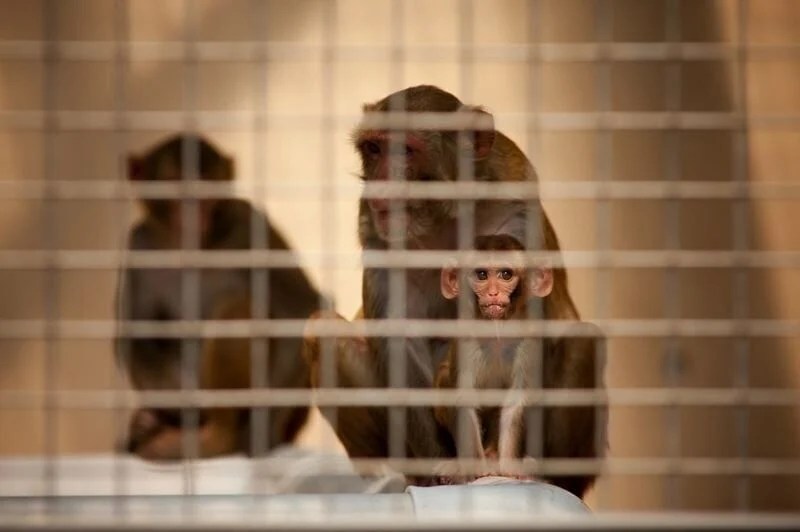Advocacy group asks DOGE to defund OHSU’s controversial primate research center near Hillsboro
Published 5:00 am Thursday, April 10, 2025

- Rhesus macaques at OHSU's Oregon National Primate Research Center in Hillsboro. (File Photo)
Weeks after Oregon Gov. Tina Kotek called for the closure of Oregon Health & Science University’s primate research center, an advocacy group is petitioning the Department of Government Efficiency to eliminate its federal funding.
On Tuesday, April 8, the Physicians Committee for Responsible Medicine submitted a complaint via email to DOGE Senior Advisor Gavin Kliger, requesting the immediate defunding of the Oregon National Primate Research Center, located between Hillsboro and Beaverton.
The complaint, signed by the group’s science policy program manager, Janine McCarthy, specifically cites research focusing on cannabis and alcohol exposure — including experiments that resulted in monkeys being killed and dissected or subjected to distressing procedures.
McCarthy argues that the primate research center is “conducting wasteful, duplicative and unethical experiments on nonhuman primates,” violating the Animal Welfare Act and Public Health Service policies.
The center received $56 million from the National Institutes of Health in fiscal year 2024 — funding that the group asserts should be terminated.
“These funds are being misused to support studies that lack scientific merit and inflict avoidable pain and suffering on animals despite the ready availability of superior, human-relevant research methods,” the letter states. “We respectfully urge the Department of Government Efficiency to act swiftly to terminate all federal funding for these experiments and to initiate a full compliance and efficiency review of (Oregon National Primate Research Center’s) animal research program.”
DOGE — created during President Donald Trump’s second administration and headed by billionaire Elon Musk — has billed itself as a watchdog dedicated to eliminating “waste, fraud and abuse.” The agency has slashed federal budgets and laid off thousands of government workers since setting up shop, leading to widespread criticism for eliminating consumer protections, cutting Medicaid and reducing Social Security services.
In response to the complaint, Sara Hottman, associate director of media relations for OHSU, stated that there is a robust regulatory process for research involving animals. Funding from the National Institutes of Health requires scientific review to ensure the research has value, minimizes animal pain and use and does not duplicate previously conducted studies.
“In all cases, state and federal regulators and OHSU’s own strict policies require transparency and oversight to demonstrate that proposed research using animals benefits science and human health,” the Hottman said. “Animal studies at OHSU are only conducted when other nonanimal research methods — such as laboratory-based cell culture, simulation, gene chips, or computer modeling — are scientifically inadequate and/or when experimental designs are too dangerous for human participants.”
Regarding the advocacy group’s claims that the primate research center has not adhered to the requirements of the Animal Welfare Act and Public Health Service policy, Hottman noted that the projects were deemed in accordance with Public Health Service policy under peer scientific review at the National Institutes of Health. OHSU added that the U.S. Department of Agriculture, responsible for enforcing the Animal Welfare Act, has not cited the studies as noncompliant.
A storied debate
Founded in 1962, the Oregon National Primate Research Center houses more than 5,000 primates and is one of seven federally funded primate research facilities in the country that have long stood at the center of ethical debate.
Supporters — including OHSU leadership — have lauded the center’s contributions to scientific advancements, citing its role in developing vaccines for influenza and tuberculosis, improving reproductive and women’s health, and advancing behavioral and mental health research.
Critics, however, contend that these goals can be pursued without the use of animal testing. Animal welfare advocates and medical ethicists argue that modern, human-relevant methods offer a more ethical and efficient path forward.
Tensions surrounding the facility have escalated amid OHSU’s proposed merger with Legacy Health. The Physicians Committee for Responsible Medicine, which has long opposed the primate research center, launched a series of television ads and public outreach efforts urging the community to push for the center’s closure as part of negotiations to acquire Legacy.
The group marked a turning point in late March, when Kotek publicly called for the center to be shut down. Just weeks later, on April 7, the Community Review Board — an oversight body under the Oregon Health Authority — unanimously recommended against approving the OHSU-Legacy merger, with the primate center factored into the board’s deliberations. While the decision is not final, it will be reviewed by OHA’s Health Care Market Oversight program in a future meeting.
In response to mounting pressure, OHSU officials have defended the center, warning that its closure would jeopardize hundreds of jobs and dismantle vital scientific research. The university has also pointed to the financial toll of shuttering the facility, estimating the cost at well over $100 million.
Peter Barr-Gillespie, OHSU’s chief research officer and executive vice president, linked the call to a broader trend of hostility toward public science institutions. In an email to employees following Kotek’s announcement, he framed the situation as part of a national pattern.
“Like you, I am witnessing a concerted federal attack on science that will have profound effects on our ability to find effective therapies and cures for diseases, and that will diminish health outcomes for generations to come,” he wrote.





